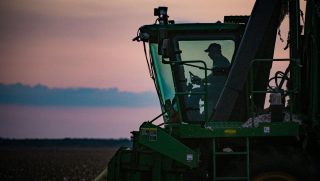Farmers have to deal with so many circumstances outside of their control. Mother Nature can (and will) throw just about anything at you, it’s hard to find good help for the farm, there’s regulations, taxes, and break downs — and that’s just the tip of the iceberg. All of it can be a lot to handle, and when you add mental health challenges to the mix, the result can be devastating to farm families.
A 2020 study from the National Institutes of Health found that 70 percent of young farmers and ranchers met the criteria for generalized anxiety disorder and more than 50 percent met the criteria for major depressive disorder.
So how do farmers manage the symptoms brought on by their mental health while still maintaining the farm on a day-to-day basis? It’s not easy, but there are ways to do it and live well, according to two farmers who have shared their stories with AGDAILY.
Animals can tell
Bethany Wilhelm-Atkins, from Kentucky, has fought anxiety and depression her entire life and began seeing a counselor in high school. She grew up near St. Louis, and attended Murray State University with dreams to become a vet.
“My mom told me I wasn’t smart enough to become a vet, which hit me really hard,” she says. “That led to a spiral in my mental health.”
After being diagnosed with obsessive-compulsive disorder (OCD), Wilhelm-Atkins met her husband, Greg, whose grandparents farmed.
“Farming was new to me, but I never put it together that the animals were helping my mental health,” she says. “I got my first dog, a pug named Otis, in 2003, and it really helped my anxiety. Animals can really tell when you’re stressed.”
Wilhelm-Atkins added an Arabian horse, Danna, a year later. After that, people began contacting her about taking in abused and/or neglected animals.
The turning point came in 2012, when she adopted a pig named Leroy.
“He’d been hit by a train, and lost half of his ham and almost lost his front right leg,” she says. “This little pig was the reason I got out of bed. Taking care of him was something I was excited about, and that’s what kept me going. Even though I didn’t want to do anything, that little pig was waiting for me, so I made myself go through the motions of every day.”
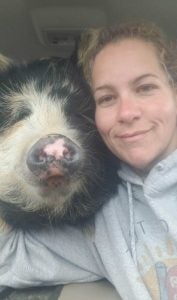
The experience made Wilhelm-Atkins fall in love with pigs, in particular. In addition to working with the animals, she strives to maintain her physical health. Two years ago, Wilhelm-Atkins got a gastric sleeve, which resulted in her losing 155 pounds.
“Physical health goes along with mental health,” she says. “I never would’ve put the two together, but when you feel better about yourself physically, you feel better about yourself mentally, too. I’ve now qualified for the U.S. national triathlon.”
Feeling better mentally and physically has allowed Wilhelm-Atkins to regain her confidence, allowing her to go out and help others, which is comforting to her.
“I’m able to relate to people with their anxiety and/or depression, and offer help, which makes me feel good,” she says. “For the first time in my life, I’m happy. I didn’t know what that felt like until the last year, year-and-a-half.”
That doesn’t mean Wilhelm-Atkins doesn’t still have bad days — she admits that she does. For her, holidays or anniversaries are triggers, and she says that on those days, she allows herself be sad.
“But I can’t dwell on it. I’ve got to keep going,” she says.
A Place to Be
Today, Wilhelm-Atkins has a 20-acre farm called A Place to Be, for which she has achieved nonprofit status. She takes in animals, rehabilitates them, and rehomes them.
“Knowing that these animals are going through things and some suffered through bad situations allows us to open some doors for people who may be going through similar situations to come out and see that you can overcome some obstacles that may be in your way. We welcome people of all diversities, genders, from the LGBTQ community, to come to our farm to be anything — sad, happy, etc.,” she says.
Wilhelm-Atkins says that people come to the farm and interact with the animals, which is therapeutic for the humans and helps socialize the animals, so they’re more likely to be adopted.
“People can just come out and sit, work through whatever they’re working through,” she says. “There are lots of kids going through the court system and not knowing how to process it. People they turn to are judgy, but animals don’t care. All they care about is you loving on them.”
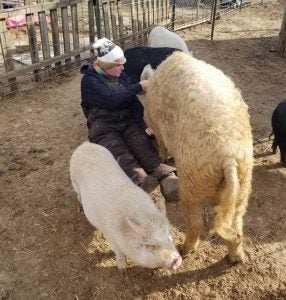
Wilhelm-Atkins is involved with her local Humane Society, and there’s a special drop pen at the animal shelter that sometimes is the source for animals that end up on her farm.
“We have seven goats, and we’d take them and Leroy to a local camp to educate the kids about animals,” she says.
Leroy passed away in January 2023, but Wilhelm-Atkins has another pig, Loaf, that she uses to provide pet therapy for people. Loaf made a big impact in the aftermath of the tornado that hit western Kentucky in December 2021.
“We were asked to bring some animals for therapy, and this huge guy came up and started talking to Loaf,” Wilhelm-Atkins says. “The day after the tornado, this guy was on his way to the gas station, and saw the corpse of a dead man in a tree. He felt so much guilt for not ‘doing the right thing’ by stopping, and he was sobbing. When he got to the gas station, he told a state trooper what he’d seen.”
After the man shared his story, he told Wilhelm-Atkins that it was the first time he’d felt like smiling since the incident.
“Animals can listen to people, even those who may not talk,” she says. “Animals can do some amazing things when it comes to the world of mental health. Seeing people smile after something like that, it’s very humbling.”
Since the COVID-19 pandemic, so many people are struggling with depression and/or anxiety and need an outlet just to get through the day. Wilhelm-Atkins says a stigma over mental health still lingers in her corner of Kentucky.
“If you have a broken arm, of course, you’d go to the doctor and get it fixed,” she says. “But if you say you’re struggling with anxiety, people give you that look, and you’re marked as somebody who might do something rash. It’s really sad. …
“In western Kentucky, there’s nowhere for people to go if they have mental health needs,” she says. “Counselors are packed — it can take two to three months just to get in.”
There’s a reason
Bree, a farmer from Missouri, was diagnosed with attention-deficit/hyperactivity (ADHD) disorder and generalized anxiety disorder at age 40, surprising even those who knew her best.
“My husband was my best friend before we started dating, and nobody knows more about me than him. Even he didn’t know the level I was at because I was able to function without showing my anxiety and ADHD,” says Bree, who asked that her last name be withheld to protect her privacy. “Inside, I felt like a failure.”
Imposter syndrome can be especially troublesome for those who struggle with anxiety and ADHD, Bree says, because the outside façade seems normal, but inside, the person is in turmoil.
“My diagnosis was terrifying and a relief,” she says. “It fit. I’d been finding my own coping mechanisms just to function, and to everyone else, I looked fine. But on the inside, I felt like a tower of cards that’s about to topple.”
She adds that her feeling of failure came from how her symptoms manifested in her daily life.
“I’m not scatterbrained — it’s because of symptoms I didn’t even recognize,” Bree says. “I’m not adulting well because I can’t sit and focus on something for an hour, or I’m not really flighty, even though I go back and forth between hobbies and never finish anything. I’m not lazy-there’s a reason for why I am the way I am and now I know and can move forward.”
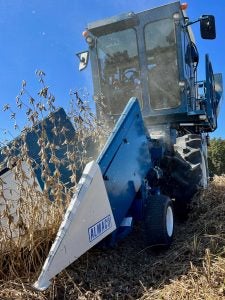
Bree says her anxiety escalated, because she went undiagnosed for so long. In her area of Missouri, even when someone is ready to seek help for mental health issues, there’s not a lot of resources available.
“When COVID hit, my anxiety spiraled out of control,” she says. “We were ramping up for planting season when things started shutting down, and we didn’t know how we would keep our employees safe and healthy. How would we manage planting if everyone got sick?”
COVID pushes the limit
Bree and her husband operate a private agricultural research company on their farm. Companies hire them to conduct unbiased research and trials to obtain reliable data.
“We test products that are already on the market, see how they compare to others, look at how that product works in a particular herbicide or fungicide program, variety testing, work with biologicals, work with new products that may not have received their labels yet from the EPA,” she says. “We follow EPA regulations and strict laboratory and research practices, there’s lots of paperwork and data collection for accountability.”
Bree’s ag research company does only crop research and has studied corn, soybeans, rice, cotton, specialty crops, tree crops, vegetables, and grasses like fescue and/or Bermuda.
“Our daily life looks a lot like what you think of as normal farming, except it’s all small-scale,” she says. “We’re doing plots to simulate a big field, using specialty equipment, and data collection.”
During COVID, Bree was concerned that if planting didn’t occur, they wouldn’t be able to do some trials for an entire year. The local attitude about the pandemic in general also didn’t help her mental health.
“Not at first, but later in 2020, anyone taking precautions would get a lot of pushback,” she says.
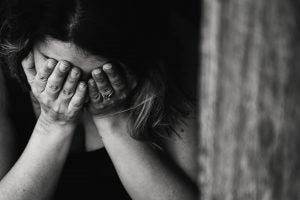
Everything ultimately caused Bree to have an anxiety attack, and she revealed to her husband the invisible yoke she was carrying.
“I didn’t know what to do, I was overwhelmed, and my husband didn’t try to convince me I didn’t need help. He said he didn’t understand what I was going through, but he wanted to help me,” she says. “He even set up my first counseling appointments to get me started. He acknowledged that I was obviously struggling and wanted to help me with whatever he could.”
For Bree, in-person counseling led to an assessment, which resulted in her diagnosis. She says that in-person counseling works best for her.
“I’m trying to be more open about it, because I know there’s other people in the same boat, but it feels hard sometimes,” she says. “Now, I look at it like, why didn’t I get help or read the symptoms sooner, but it’s so overwhelming, especially living in a rural area.”
Necessary alone time
Bree notes that conducting research has forced her to establish coping mechanisms so she can be effective, organized and successful, especially during planting and harvest.
“I didn’t have coping mechanisms when I was growing up, and every time I created one, it made it easier for me now,” she says. “I just needed medication to rein things back in so I could function with my coping mechanisms again. I’m glad that I’m not trying to start learning how to use coping mechanisms at age 40.”
The solitary nature of agricultural work allows her introverted nature to recharge — while boosting her mental health.
“Riding the planter, you’re focused, doing repetitive work, or riding in the combine, you’re by yourself, and just having that alone time is really important,” she says. “We’ve got two kids, ages 12 and 10, so I don’t always get that at home. Collecting data, being outside in the fresh air, gives me that good feeling.”
Bree still struggles with being fully open about her mental health challenges in a professional setting, but she’s seeing signs that there’s becoming more acceptance on a professional level. Bree and her husband are members of a professional consultants’ organization, and the last several years at their annual meeting, there’s been topics on evaluating mental health, work-life balance, and communicating with employees.
“I wondered if there’d be a lot of pushback, but people really wanted to talk about it,” she says. “Maybe people are finally realizing we should’ve been addressing this years ago.”
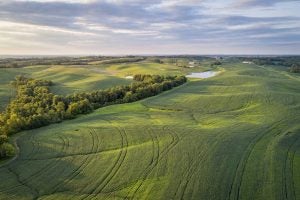
Another challenge for Bree is the fact that her medication is a selective serotonin reuptake inhibitor (SSRI), a common medication used for anxiety and depression. However, SSRIs can cause excessive sweating and make patients more likely to suffer from heat exhaustion — which is challenging when you work in the agriculture industry, outdoors in the heat for long periods.
“I’m working with my psychiatrist to find a different medication, but I’m also concerned about adjusting to new meds, because I felt terrible and jittery the first week or so that I started taking my medication the first time,” Bree says. “You want to find a medication that will resolve your symptoms without having side effects that will hold you back. Just communicating that well is a big problem, and not everybody realizes that.”
Advice to others
Wilhelm-Atkins says that if you or someone you love is struggling with mental health, don’t be afraid to talk about it.
“When I was growing up, you didn’t talk about how you were feeling,” she says. “I’ve realized I’m not alone in this darkness and battle, and that’s made a big difference.”
People are being more transparent about how they’re doing mentally, and there’s nothing wrong with seeking help, she adds.
“There are a lot of other options available besides counseling,” Wilhelm-Atkins says. “There are always resources out there. Anything is better than being by yourself and wondering what’s wrong with you. I wish mental health wasn’t so scary for people. I see people struggling, and it makes me so sad.”
Reaching out to someone who’s struggling with their mental health is so important, Wilhelm-Atkins says, because you never know what door you’re going to open for someone else.
“You may be 10 miles from your nearest neighbor, but you can always call somebody,” she adds.
Sitting down and honestly evaluating your mental health is the first step, and Bree reiterates that it’s the hardest one.
“Listening to that nagging voice in the background, not pushing it down anymore and ignoring it, and not convincing myself that I was fine — I was being stubborn and didn’t want to confront it,” Bree says. “Everyone, regardless of mental health status, can benefit from counseling. It’s nice to sit and talk to somebody about what’s going on in your life.”
Bree also admits that she’s been very supportive of others who struggled with mental health, but put a stigma on mental health when it came to her own challenges.
“I’ve found, the more you talk about it, the more you find other people going through the exact same thing,” Bree says. “It’s shocking to me how many people have mental health challenges — people I’d never guessed, who seemed really put together.”
Some great resources to check out include:
- Veteran’s assistance or hospitals, if you’ve served
- Telehealth services like BetterHelp
- Local churches — many pastors provide counseling services or can refer you to other resources
Bree notes that the brain is an organ, and just like any other organ in our body, sometimes it doesn’t function properly and needs help from medicine.
“We’d never give someone a hard time about being diabetic and needing insulin,” Bree says. “Why are we treating mental health that way? That negative stigma is hurting people.”
Sarah Hill is an agricultural writer and communications professional from Hetland, South Dakota. She grew up on a dairy in Missouri and is a 2008 graduate of the University of Missouri with a degree in Agricultural Journalism.

